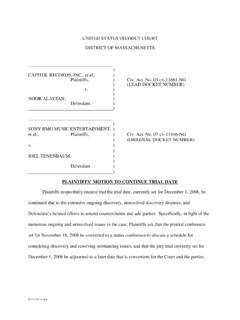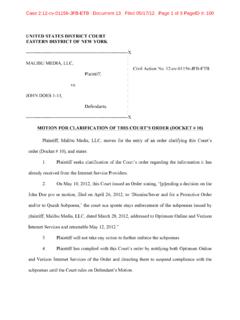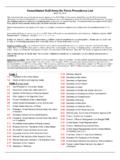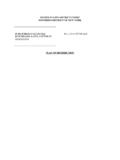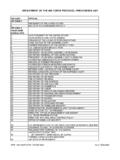Transcription of UNITED STATES DISTRICT COURT EASTERN DISTRICT OF ...
1 1 UNITED STATES DISTRICT COURT EASTERN DISTRICT OF PENNSYLVANIA MOTOWN RECORD COMPANY, , et al Plaintiffs, v. JOHN C. KOVALCIK, Defendant. _____ : : : : CIVIL ACTION NO. 2:07-cv-04702-AB : : : : JUDGE CYNTHIA M. RUFE : : DOCUMENT FILED ELECTRONICALLY MEMORANDUM OF LAW IN SUPPORT OF DEFENDANT S MOTION FOR JUDGMENT ON THE PLEADINGS PURSUANT TO FED. R. CIV. P. 12(C) AND NOW comes the Defendant, John C. Kovalcik, by and through his counsel, Richard J. Bove, and file the within Motion for Judgment on the Pleadings, averring as follows: I. INTRODUCTION AND PROCEDURAL HISTORY This case was initiated with Plaintiffs' filing of a Complaint on or about February 20, 2008, in the Federal DISTRICT COURT , EASTERN DISTRICT of Pennsylvania.
2 Plaintiffs, in their Complaint, allege upon information and belief that Defendant has downloaded and/or distributed to the public copyrighted sound recordings owned by or exclusively licensed to Plaintiffs. Plaintiffs further allege that they have suffered damages as a result of Defendant's alleged actions. As set forth more fully below, Plaintiffs' Complaint irreparably fails to set 2 forth a claim for copyright infringement or any other theory of liability, and must be dismissed with prejudice. II. STATEMENT OF FACTS As this is a motion for judgment on the pleadings, the COURT is to look at the allegations found in the four corners of the Plaintiffs complaint for copyright infringement, to the extent said complaint contains any facts.
3 III. STANDARD REVIEW: FED R. CIV. P. 12(C) After the pleadings are closed but within such time as not to delay trial, any party may move for judgment on the pleadings. Fed. R. Civ. P. 12(c); S&S Constr., Inc. v. Reliance Ins. Co., 42 F. ( 1998). When considering a Rule 12(c) motion, the COURT must construe the allegations in the complaint in the light most favorable to the non-moving party. See Turbe v. Government of Virgin Islands, 938 427, 428 (3d Cir. 1991) (holding that when a Rule 12(c) motion alleges plaintiff's failure to state a claim upon which relief can be granted, we analyze the motion under the same standard as a Rule 12(b)(6) motion to dismiss). "[W]hen ruling on a defendant's motion to dismiss, a judge must accept as true all of the factual allegations contained in the complaint.
4 " Erickson v. Pardus, 127 S. Ct. 2197, 2200, 167 L. Ed. 2d 1081 (2007) (citing Bell Atlantic Corp. v. Twombly, 127 S. Ct. 1955, 1965, 167 L. Ed. 2d 929 (2007). A COURT may grant a motion for judgment on the pleadings when no genuine issues of material fact remain and the case can be decided as a matter of law. Id. The COURT may, however, take judicial notice of facts not contained in the complaint without 3 converting the motion into that for summary judgment. Cf. In re FAC Realty Secs. Litigation, 990 416 ( 1997) (in 12(b)(6) motion, written materials not attached to complaint or incorporated by reference but integral to allegations of complaint and known to nonmoving party), In re Criimi Mae, Inc.)
5 Secs. Litigation, 94 652 ( 2000) (in securities fraud case, COURT may consider relevant press releases and public disclosure documents referenced and relied upon by plaintiffs without converting 12(b)(6) motion into one for summary judgment). Wright & Miller, 5B Federal Practice and Procedure: Civil 3d 1357 at (Supp. 2007). Although a moving party, for the purposes of the Rule 12(c) motion, concedes the accuracy of the factual allegation in his adversary s pleading, he does not admit other assertions in the other party s pleading that constitute conclusions of law, legally impossible facts, or matters that would not be admissible in evidence in trial. Wright & Miller, 5C Federal Practice and Procedure: Civil 2d 1368 (2d ed.)
6 1995) (citing, inter alia, Grindstaff v. Green, 133 416 (6th Cir. 1998); Duhame v. , 119 192 (Ct. Cl. 1954)). However, all reasonable inferences and intendments from the pleading s factual allegations are drawn in favor of the nonmoving party. King v. Gemini Food Services, Inc., 438 964 ( 1976). A dismissal pursuant to Rule 12(c) is with prejudice. LaRue v. DeWolff, Boberg &Associates, Inc., 450 570 (4th Cir. 2006); ex rel Bledsoe v. Community Health Systems, Inc., 501 493, 2007 WL 2492439 (6th Cir. 2007); Jung v. Association of American Medical Colleges, 184 9 ( Cir. 2006); Bull v. , 63 580 4 ( 2005); J. Moore, et al., 11-56 Moore's Federal Practice - Civil (Rule 12(c) motions for judgment on the pleadings result in final adjudication of a case or claim.
7 Rule 12(b)(6) requires that a claim be dismissed if the plaintiff fails to allege "enough facts to state a claim to relief that is plausible on its face." Tegg Corp. v. Beckstrom Electric Co., 2008 Dist. LEXIS 52184 *12 ( Pa. July 1, 2008) (citing Bell Atlantic Corp. v. Twombly, 127 1955, 1964 (2007). See also: Phillips v. County of Allegheny, 515 224, 234 (3d. Cir. 2008). Although the COURT accepts all well-pled material allegations as true and draws all reasonable inferences therefrom in favor of the non-moving party, the COURT cannot accept bald assertions, unwarranted inferences, or sweeping legal conclusions cast in the form of factual allegations. See: In re Rockefeller Ctr. Props., Inc. Secs.)
8 Litig., 311 198, 215 (3d. Cir. 2002; Morse v. Lower Merion Sch. Dist., 132 902, 906 (3d. Cir. 1997); Twombly, 127 S. Ct. at 1964. IV. ARGUMENT In order to sufficiently state a claim for copyright infringement, the plaintiff has the burden to allege with specificity the acts by which defendant has infringed upon the plaintiffs copyright. Marvullo v. Gruner & Jahr, 105 F. Supp. 2d 225, 230 ( 2000); DiMaggio v. International Sports Ltd. 1998 Dist. LEXIS 13468 at *4-5 ( Aug. 31, 1998); Brought to Life Music, Inc. v. MCA Records, Inc., 2003 Dist. LEXIS 1967 at *3 ( Feb. 11, 2003), Lindsay v. The Wrecked and Abandoned Vessel Titanic, 1999 Dist. LEXIS 15837 at *8, 12 ( Oct. 13, 1999), Stampone v. Stahl, 2005 5 WL 1694073 at *2 ( July 19, 2005).)
9 This pleading requirement demands the plaintiff allege with specificity all facts supporting each element of its claim, including the time of the alleged infringement and by what manner or mechanism the defendant committed the alleged infringement. Marvullo, supra; DiMaggio, supra; Brought to Life, supra; Lindsay, supra; Stampone; supra. Although pleading upon "information and belief' is appropriate for claims which may be generally pled, claims for copyright infringement must be pled with specificity, and include a statement of facts upon which the plaintiffs allegations are based. Fountain v. Talley, 104 F. Supp. 2d 1345, 1355 ( Ala. 2000) (granting motion to dismiss when mere information and belief was pled as factual basis for claim that was to be pled with specificity).
10 Here, Plaintiffs use a boilerplate complaint used by RIAA-Affiliated Plaintiffs across the country in litigation identical to this case. This complaint, and its brethren, fail to state their claim sounding in copyright infringement as they have failed to allege any actual act of infringing distribution, failed to plead a time in which the alleged distribution took place, and failed to identify the Defendant as the alleged infringing entity. As set forth more fully hereinafter, these defects are fatal, and Plaintiffs' Complaint must be dismissed. 1. Plaintiffs fail to state a claim for copyright infringement insofar as Plaintiffs fail to allege, and are incapable of alleging, any act of distribution To state a claim for copyright infringement, Plaintiffs must demonstrate two elements: (1) plaintiff's ownership of a valid copyright to the material in dispute, and (2) unauthorized copying of original elements of the plaintiff's work.
